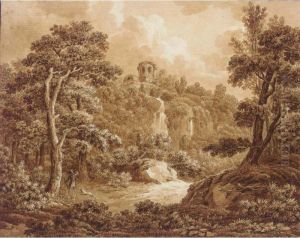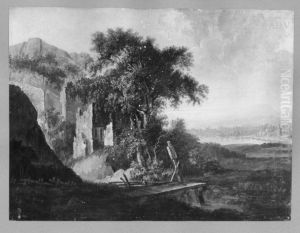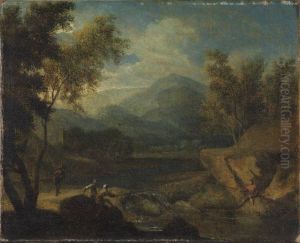Johann Sebastian Bach Paintings
Johann Sebastian Bach was a German composer and musician of the Baroque period. Born on March 31, 1685, in Eisenach, in the duchy of Saxe-Eisenach, into an extensive musical family, his father, Johann Ambrosius Bach, was a director of town musicians, and all of his uncles were professional musicians. His mother, Maria Elisabeth Lämmerhirt, also came from a musical family. Bach was the youngest of eight children.
From an early age, Bach was steeped in a rigorous study of music, primarily under the tutelage of his father and later his brother, Johann Christoph Bach, after the early deaths of his parents. He attended the St. Michael's School in Lüneburg, which provided a firm foundation in theology, Latin, and music, particularly in the choir which had a rich musical tradition.
Bach's professional life commenced as an organist in Arnstadt and Mühlhausen, where he also began to compose his first church cantatas. In 1707, he married his cousin Maria Barbara Bach and they had seven children, several of whom died young. Maria Barbara passed away in 1720, and Bach remarried in 1721 to Anna Magdalena Wilcke, a talented soprano, with whom he had thirteen more children.
In 1708, Bach became the court organist at Weimar, and later the Konzertmeister (concertmaster), where he composed many of his works for organ and other keyboard instruments. In 1717, he moved to Köthen to serve as Kapellmeister (chapel master) for Prince Leopold. Here, Bach's focus was more on secular music, including his Brandenburg Concertos and the well-known 'Well-Tempered Clavier.'
Bach's most notable position was as Thomaskantor (Cantor at St. Thomas) in Leipzig, which he held from 1723 until his death. In Leipzig, he composed many of his greatest works, including the St. Matthew Passion, the Mass in B minor, and the Christmas Oratorio. Bach was also responsible for the music at four churches in the city and ran the Thomanerchor (St. Thomas Boys Choir).
Bach's music is revered for its intellectual depth, technical command, and artistic beauty. He was known to have been deeply religious, which was a driving force in his compositions, primarily those written for the church. Despite his success, he was not widely recognized as a great composer during his lifetime, and his work was somewhat neglected shortly after his death. It was not until the 19th century that his music was rediscovered, largely thanks to the efforts of composers such as Felix Mendelssohn, and he became recognized as one of the greatest composers in the Western musical canon.
Johann Sebastian Bach passed away on July 28, 1750, in Leipzig, after suffering from complications due to eye surgery. Today, he is considered one of the most important figures in the history of music, and his compositions continue to be performed and celebrated around the world.


